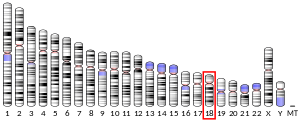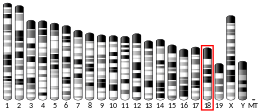Strausberg RL, Feingold EA, Grouse LH, et al. (2003). "Generation and initial analysis of more than 15,000 full-length human and mouse cDNA sequences" . Proc. Natl. Acad. Sci. U.S.A . 99 (26): 16899– 903. Bibcode :2002PNAS...9916899M . doi :10.1073/pnas.242603899 PMC 139241 PMID 12477932 . Kljuic A, Bazzi H, Sundberg JP, et al. (2003). "Desmoglein 4 in hair follicle differentiation and epidermal adhesion: evidence from inherited hypotrichosis and acquired pemphigus vulgaris" . Cell . 113 (2): 249– 60. doi :10.1016/S0092-8674(03)00273-3 PMID 12705872 . S2CID 15131587 . Rafiq MA, Ansar M, Mahmood S, et al. (2004). "A recurrent intragenic deletion mutation in DSG4 gene in three Pakistani families with autosomal recessive hypotrichosis" . J. Invest. Dermatol . 123 (1): 247– 8. doi :10.1111/j.0022-202X.2004.22715.x PMC 6157275 PMID 15191570 . Gerhard DS, Wagner L, Feingold EA, et al. (2004). "The Status, Quality, and Expansion of the NIH Full-Length cDNA Project: The Mammalian Gene Collection (MGC)" . Genome Res . 14 (10B): 2121– 7. doi :10.1101/gr.2596504 . PMC 528928 PMID 15489334 . Nagasaka T, Nishifuji K, Ota T, et al. (2004). "Defining the pathogenic involvement of desmoglein 4 in pemphigus and staphylococcal scalded skin syndrome" . J. Clin. Invest . 114 (10): 1484– 92. doi :10.1172/JCI20480 . PMC 525737 PMID 15545999 . Bazzi H, Martinez-Mir A, Kljuic A, Christiano AM (2006). "Desmoglein 4 mutations underlie localized autosomal recessive hypotrichosis in humans, mice, and rats" . Journal of Investigative Dermatology Symposium Proceedings . 10 (3): 222– 4. doi :10.1111/j.1087-0024.2005.10110.x PMID 16382669 . Bazzi H, Getz A, Mahoney MG, et al. (2006). "Desmoglein 4 is expressed in highly differentiated keratinocytes and trichocytes in human epidermis and hair follicle". Differentiation . 74 (2– 3): 129– 40. doi :10.1111/j.1432-0436.2006.00061.x . PMID 16533311 . Wajid M, Bazzi H, Rockey J, et al. (2007). "Localized autosomal recessive hypotrichosis due to a frameshift mutation in the desmoglein 4 gene exhibits extensive phenotypic variability within a Pakistani family" . J. Invest. Dermatol . 127 (7): 1779– 82. doi :10.1038/sj.jid.5700791 PMID 17392831 .



